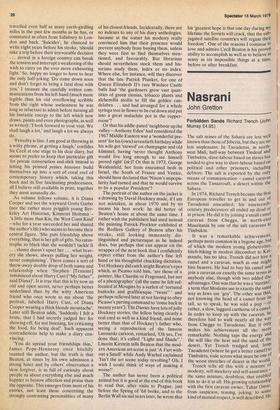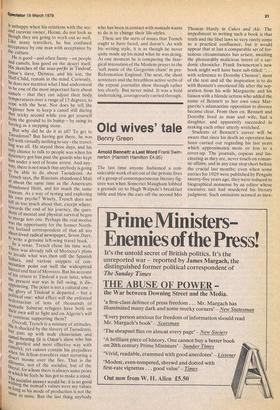Nasrani
John Gretton
Forbidden Sands Richard Trench (John Murray £4.95)
The salt mines of the Sahara are less well known than those of Siberia, but they are no less unpleasant. In Taoudenni, in north west Mali, half-way between Tindouf and Timbuktu, slave-labour based on slaves has tended to give way to slave-labour based on political and other prisoners, including debtors. The salt is exported by the onlY means of communication — camel caravan across the Tanazrouft, a desert within the Sahara.
In 1974, Richard Trench became the first European traveller to get in and out of Taoudenni unscathed; his nineteenth' century predecessors all ended up dead or in prison. He did it by joining a small camel caravan from Chegga, in north-east Mauritania by one of the salt caravans to Timbuktu.
It was a remarkable achievement, perhaps more common in a bygone age, but of which the modern young globetrotter, hitch-hiking in modest discomfort to Katmandu, has no idea. Trench did not hire a camel and a caravan, much as one might hire bearers. He had to buy his camel and join a caravan on exactly the same terms as anybody else, though with two added di.s: advantages. One was that he was a `nasrani a term that Moslems use in exactly the same way as Jews use 'goy'. The other was tha. t, not knowing the head of a camel from its tail, so to speak, he was sold a pup °,r rather, a slow, laggard carthorse of a camel. In order to keep up with the caravan, he therefore had to walk nearly all the way from Chegga to Taoudenni. But it only makes his achievement all the more remarkable. Nothing saps the energy and the will like the heat and the sand of the desert. Yet Trench trudged and, from Taoudenni (where he got a better camel) to Timbuktu, rode across what must be one of the worst stretches of desert in the vvorld. Trench tells all this with a mixture of modesty, self-mockery and self-assurance the same mixture, doubtless, that enabled him to do it at all. His growing relationsh'P with the first caravan owner, Tahar Omar, from suspicion, teasing, joking, to sonic kind of mutual respect, is well described. He
(
is unhappy when his relations with the second caravan owner, Hotan, do not look as though they are going to work out so well. Like many travellers, he has confused acceptance by one man with acceptance by the culture.
He is good — and often funny —on people and camels, less good on the desert itself.
His sketches of the sous-prefet in Tindouf, Omar's slave, Dermas, and his son, the 11, alt.-Child, remain in the mind. Curiously, ne does not mention what I had understood to be one of the most important facts about camels — that they can adjust their body temperatures over a range of 15 degrees, to c,013e with the heat. Nor does he tell the neginner how to keep a camel still during from tricky second while you get yourself irom the ground to its hump — by using its ( foreleg as a stepping stone. ut why did he do it at all? To get to Taoudenni? But having got there, he was left with virtually nothing to say — the travelling was all. He stayed three days, and his °My chance to talk to people was when his dysentery got him past the guards who kept him under a sort of house arrest. And anyway, there is not much that anybody is going tel be able to do about Taoudenni. As Trench says, the Russians abandoned Mali at about the same time as the Americans abandoned Haiti, and for much the same reasons. As a way of testing and exploring his own psyche? Wisely, Trench does not tell us too much about that, except where, towards the end of his journey, the questions of mental and physical survival began M merge into one. Perhaps the real motive
was the opportunity for the former North ern Ireland correspondent of that all too
short-lived radical newspaper, Seven Days,
M write a genuine left-wing travel book. .„ In a sense, Trench chose his time well. "here was already talk of Morocco's plans to invade what was then still the Spanish Sahara, and various snippets of con
versation point out well the widespread hatred and fear of Morocco. But his account (,),f_ his return to Tindouf a year later, when ine present war was in full swing, is disaPPointing, The point is not a cultural one — tue glory of Tindouf is departed — but a Political one: what effect will the enforced sedentarism of tens of thousands of nomadic Saharan refugees have both on !heir own will to fight and on Algeria's will t° continue supporting them? Overall, Trench is a mixture of attitudes.C. IS shocked by the slavery of Taoudenni, '41t puts up with male chauvinism and tTlhel-beating (it is Omar's slave who has lie gentlest and most effective way with e_aMels); yet cannot contain his prejudices ,when his fellow-travellers start torturing a u,a, sett mouse over the fire. That is the jemma, not of the socialist, but of the a. eral, for whom there is always some point 'Which he feels he has got to make a stand. The s m. tv; L. °int answer would be: it is no good Ing the nomad's values were my values ss long as his mode of production is not the alne as mine. But the last thing anybody
who has been in contact with nomads wants to do is to change their life-styles.
These are the sorts of issues that Trench ought to have faced, and doesn't. As with his writing style, it is as though he never quite made up his mind what he was doing. At one moment he is comparing the liturgical intonation of the Moslem prayer to the `soft music of the Gregorian chant' in preReformation England. The next, the short sentences and the breathless active verbs of the exposé journalist show through rather too clearly. But never mind. It was a bold undertaking, courageously carried through.



































 Previous page
Previous page